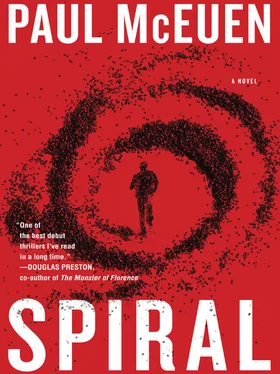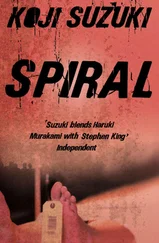“Why?”
“Just do it.”
She checked his pulse. It was slow, steady. Then the pupils. They were saucers, and completely unresponsive to light. But she couldn’t be certain if it was because of what he’d taken or the sedatives the paramedics had loaded him up on. She glanced at Kaster. She was bent over the computer, clicking on the keys. Kaster said, “Oh, wow.”
“What?”
“There was something called Unit 731. During World War Two.” She went quiet, scanning the screen.
“And?”
“It was some kind of bioweapons research facility. Japanese.” She kept reading, her face going slack. “Jesus. Listen to this. They used Chinese civilians as test subjects. Some American and Russian POWs, too. The guy who ran it, Shiro Ishii? They say he was the Japanese equivalent of Josef Mengele.”
Paige froze. “They used people as guinea pigs? For biological weapons testing?”
She nodded. “It gets worse. There’s a big warning on this page—saying that the pictures on this site are extremely graphic. Don’t go any further if you are easily upset.” Her fingers clicked on the keyboard. “Oh, Jesus.”
Paige looked over her shoulder. On the screen was a black-and-white photo of a Japanese doctor next to a metal autopsy table. The man on the table was sliced wide open. “Look at the caption,” Kaster said. “The guy was alive when they did this.”
“ Live autopsies? How come I’ve never heard of this?”
“I don’t know. But apparently these guys were working on everything. Anthrax. Black plague. Everything.”
“He’s moving!” Paige said. He’d gotten the strap off his waist and had lifted himself up on one arm, turning sideways. They grabbed him, and he fell back down on his stomach. In a few seconds, he was limp again. “Come on,” Paige ordered, all the weariness gone. “Let’s get full blood panels on this guy.”
Kaster whistled. “Look at that.”
A number was freshly tattooed low on his back, across the lumbar region.
800-232-4636
Paige was in hypervigilance mode now. Every nerve was standing on end.
“What do you suggest we do?” Kaster said.
“Call it.”
Kaster picked up the phone on the far wall, punched in the number. A second later, she lowered the phone, looking ashen.
“And?”
“It’s the Centers for Disease Control and Prevention.”
Paige snapped up straight. “No one leaves. Seal off this room. Now. ”
 16
16 
JAKE AND MAGGIE STOOD ON THE BACK PORCH, LEANING ON the railing and watching the darkness. When they’d returned from Ellis Hollow, Maggie had shown the glowing fungi to her son. Dylan had been solemn, watching the red, green, and yellow fungi slowly pulse and fade. Two months ago, Dylan said, Pop-pop had been telling him about the latest Nobel Prize in chemistry. It was for the use of fluorescent proteins, how the genes for them could be inserted into any organism, and that organism would glow. He’d promised Dylan a demonstration. Apparently, this was it.
Maggie, with an assist from Dylan, had convinced Jake to stay. Her housemates were there, along with two boyfriends: Josephine, Eric, Yvette, Cindy, and Bryan. Yvette and Josephine had dinner going; everyone drank wine from old jelly jars. Jake was completely taken in by the conversation, the mix of warmth and humor, sadness and hope. The quiet but steadfast sympathy they all expressed to Maggie and Dylan. Jake had the strong sense of family, even if no bloodlines were shared. He knew that Maggie’s parents were both dead, and her aunt and cousins were not due until the funeral.
Afterward, Jake and Maggie had drifted away from the rest, onto the back porch, winter coats on and holding steaming mugs of tea. They’d swapped stories about Liam for the better part of an hour, missing him more with each one. The last story had been Maggie’s, about the time Liam had taken her fungus hunting in Treman State Park, a few miles to the west. “I was six,” she said. “Believe it or not, I found a new species. He named it after me.”
“Really?”
“ Cordyceps margaretae . It makes an immunosuppressant that is sometimes used in transplant surgeries. I still get a little in royalties.” She laughed. “It was a setup, I’m sure. But he always denied it. Said I was the luckiest little girl he’d ever seen.”
The back door opened and Dylan came out, Turtle trailing behind. The two dissolved into the darkness of the yard, barely visible in the spare moonlight. Dylan stopped under the lights at the door to the greenhouse, then cupped his hands together and blew into them. He held his hands out, as if he was ceremoniously letting the breath go. After a few seconds, he dropped his arms and continued on inside the greenhouse.
Maggie saw Jake watching, puzzled.
“The spreading of the breaths,” she said.
“What is that?”
“An interesting little fact. How every breath contains every other one.”
“I’m not getting it.”
“Do you know how many gas molecules are in a breath?”
Jake started working on it. “Let’s see. Air is about a thousand times less dense than water. So—”
Maggie smiled. “Wait. I’ll tell you. About ten to the twenty-second power. And that’s about the same as the number of breaths in the world.”
“Okay…”
“It means that once Dylan’s breath spreads out, when someone, anyone, anywhere in the world takes a breath, it’ll have one molecule from that breath Dylan just released.”
Jake inspected the idea, looking for threads. “It must work the other way, too? Every breath we take in has a molecule from every breath anyone else ever took?”
She nodded.
“That’s disturbing somehow.”
“It can be.”
“You taught Dylan this?”
“Liam did.”
Jake heard a band of geese flying overhead. Heading south. “He was a helluva man, your grandfather. One of the few people in the world I truly looked up to.”
She turned to face him. “He really respected you, Jake. He thought you were a very decent man.”
“It’s an ex-soldier thing. Different armies, different wars, it doesn’t matter. There’s a bond.”
“It was more than that.”
Jake didn’t know what to say to that. Instead he watched Dylan at work in the greenhouse, a watering can in his hand.
“Can I ask you something?” Maggie said tentatively. “Something I always wondered?”
“Shoot.”
“Why did you join the Army?”
“You want the real answer?”
She laughed. “No. Give me the fake one.”
“Okay, I will. The fake one is that I needed money for college.”
“And the real one?”
“I thought it was the right thing to do.”
She took it in, nodding. “That’s more or less what Pop-pop said. Why he joined during World War Two. The Irish hated the British, had been under their thumb for eight hundred years. Some people called him a traitor.” She glanced at him. “What was it like?”
“The Gulf War? The thing I remember most is the sand. It got in everything, in your hair, in your bed, in the guns, in the food. You got used to the grind of it between your teeth.
“We spent six months in the desert, waiting, in the sand. I was a combat engineer. In the Forty-sixth Battalion. We were in support of the First Infantry Division. We made the bridges. The camps. The roads. We had it best, the engineers. We had something to do. We were always at work, putting up new forward compounds, improving the roads, clearing them after the sandstorms would sweep through. The combat grunts had it worse. They just sat. Waiting to fight. Digging foxholes, the sand filling them, digging them again. It was hell on them, you could tell. They got crazier, weirder.”
Читать дальше

 16
16 










